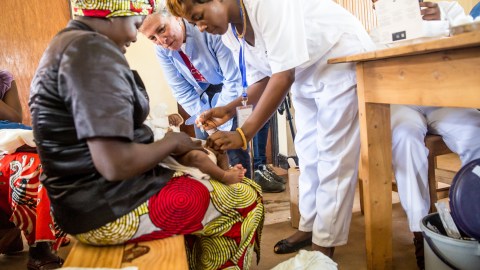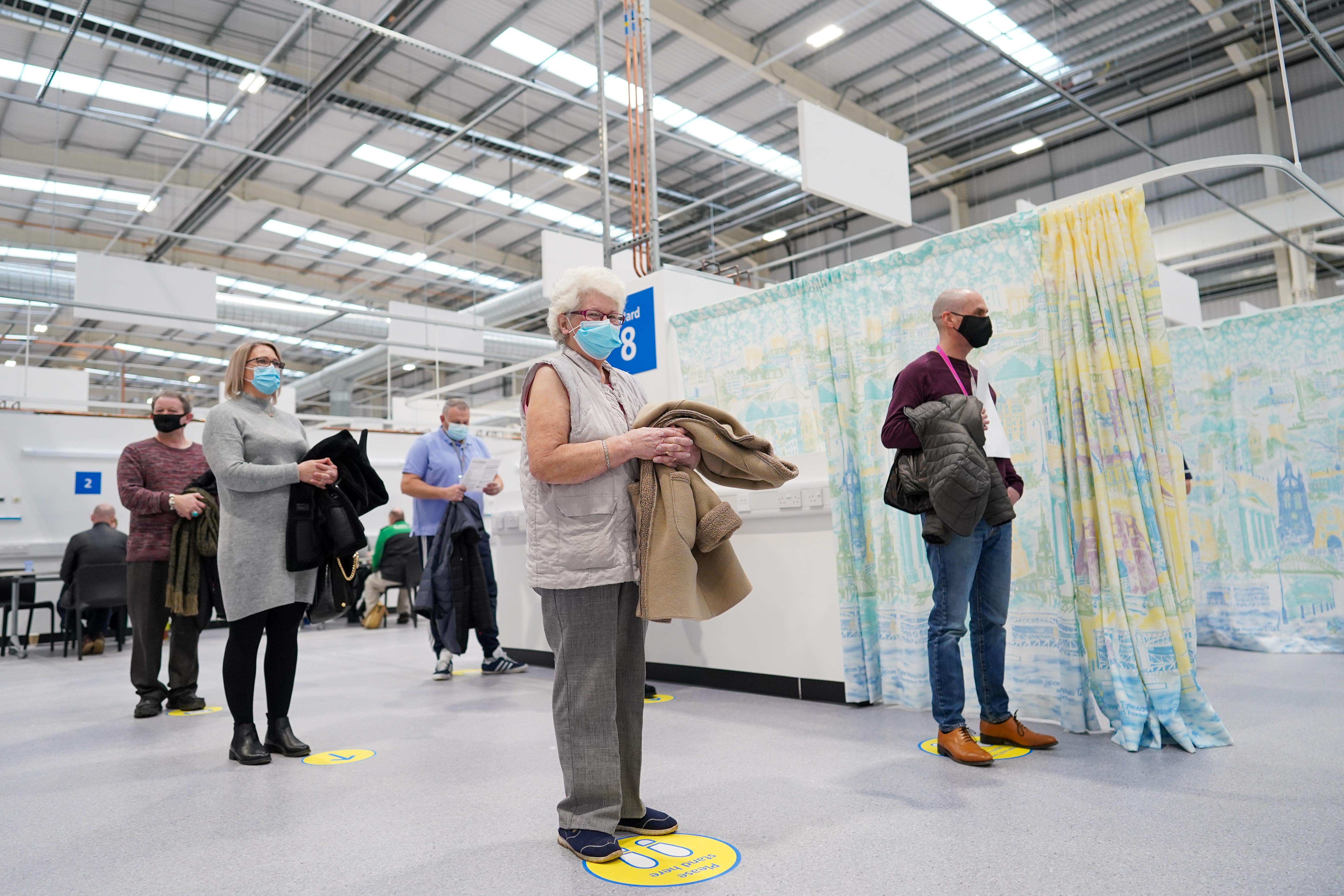How to vaccinate the world’s most vulnerable? Build global partnerships.

Susan Silbermann, Global President of Pfizer Vaccines, looks on as a health care worker administers a vaccine in Rwanda. Photo: Courtesy of Pfizer.
- Community healthcare workers face many challenges in their work, including often traveling far distances to see their clients
- Pfizer is helping to drive the UN’s sustainable development goals through partnerships.
- Pfizer partnered with AMP and the World Health Organization to develop a training program for healthcare workers.
Community healthcare workers are often the only point of contact with the health system in many underserved areas in the developing world. These noble public servants work within the community to bring health coverage closer to people who need it. Millions of babies around the world are at risk every day from vaccine preventable diseases and many of them live in very remote communities. This means that health care workers must sometimes travel long distances over mountains, across desserts and through rivers while carrying vaccine coolers.
These are some of the reasons why Pfizer is proud to partner with organizations that share a vision of increasing the health and well-being of children around the world. Susan Silbermann, Global President of Pfizer Vaccines, recently sat down with Big Think to discuss how the company is helping to improve vaccine access in developing countries.
Pfizer is helping to improve vaccine access
The constraints people face in other countries requires companies to develop more novel and innovative approaches to help improve vaccine access.
So the question for Pfizer was: Tell us what innovating a vaccine means to you?
Silbermann brought a vial to show Big Think what innovation looks like.
“This tiny vial is an incredible testament to scientific innovation. Until 2017, it provided one dose to vaccinate one child. But now it provides four doses and can vaccinate four children. By combining multiple doses into one vial we have reduced the storage space and the shipping requirements.”
Innovations like this multi-dose vial are just the beginning of making it easier to get vaccines to children. Here are a few facts that Pfizer wants to help change.
- Sub-saharan Africa bears nearly 25% of the disease burden in the world.
- It only has 3% of the global health workers.
Pfizer feels it’s critical to ensure more health care workers are trained on how to administer multi-dose vaccines.

A health care worker administers a vaccine in Malawi.
Photo: Courtesy of Pfizer.
The critical role of health care workers in the developing world
When Pfizer’s new multi-dose vial (MDV) became available in 2017 in Gavi countries, it was a priority to ensure health care workers were properly trained. For this, Pfizer partnered up with the AMP and the World Health Organization to develop a pneumococcal conjugate refresher course and new training program for the multi-dose vial.
As part of the partnership program, Pfizer developed a “train the trainer” model that is a tiered system of training. For example, “master trainers” will go on to train the next round of health care workers.
Last year, Pfizer trained over 27,000 health care workers across 15 different countries. And this year, it’s extended the program to an additional nine countries with the goal of reaching an additional 17,000 new health care workers by the end of the year.
A future dedicated to vaccine development
The overall impact vaccines are having on global public health are astounding. It’s been estimated that vaccinations have prevented 26 million cases of childhood infections in the last decade alone.
Right behind clean water, immunizations are the most important health investment we have. Pfizer employees are passionate about vaccine development because they know it will translate into a tremendous public health impact.
Once logistical barriers and other obstacles are overcome, Pfizer believes that we will be working toward building a better future in communities around the world. One the best ways to remove barriers is through working with and supporting partners.
Susan Silbermann, Global President of Pfizer Vaccines, looks on as a health care worker administers a vaccine in Rwanda.
Photo: Courtesy of Pfizer.
Why partnerships matter
Pfizer supports many projects that work to empower and equip community health workers. It recognizes that supporting health care workers is a critical part of achieving universal health coverage.
Silbermann talked with Big Think about making sure vaccines get to where they are needed.
“We have to make sure that vaccines get to those who need it. I have often said that our job doesn’t end when we make a vaccine and ship it to a distribution center. What good is a vaccine if it isn’t reaching the people who need it the most?”
Pfizer is a strategic partner of AMP Health (Aspen Management Partnership for Health), a cross sector, public private partnership to strengthen healthcare systems. AMP Health partners with Ministries of Health to help grow community health and immunization programs by providing leadership and management training and has worked in Ghana, Kenya, Malawi, Sierra Leone, and Zambia.
National governments in Sub-Saharan Africa are committed to deploying thousands of community health workers, but often don’t have the strategic, managerial, or financial skills to run a large-scale program.
Pfizer believes that professional, supported community health workers play a critical role in reaching underserved populations and that partnering with organizations like AMP Health advances this objective.
The unsung heroes
Vaccines must stay refrigerated as they travel and be stored at very specific temperatures until they are used. Health care workers often worry about the vaccine refrigerators which can be old and if they were to break down the quality of the vaccines could be at risk.
Silbermann told us a story about how a healthcare worker in Ghana ensured vaccines were available in her clinic.
“Let me tell you a story about a healthcare worker in Ghana that we recently met. She works in a clinic in a small village in the Ho region of Ghana which is approximately three hours north of the capital. In her clinic, there is no electricity or running water. These two elements are critical to ensure safe and effective use of medicines. For example, vaccines need to be stored at a specific temperature to maintain their effectiveness and therefore are stored in fridges which are powered by electricity.
“Instead of storing the vaccines in her clinic, the healthcare worker travels one hour each way on the bus to get fresh vaccines and transport them in a cooler. She then works all day at the clinic administering these vaccines and seeing mothers, children and babies. Without the dedication of healthcare workers like this one in Ghana it is very likely that communities of children would not have the opportunity to be vaccinated.”
Why is Pfizer so committed to vaccines?
Pfizer colleagues are passionate about vaccine development and innovation because they know it can translate into a tremendous public health impact. Immunization not only saves lives and improves health, it also unlocks the potential of a community—a vaccinated community is not only healthier, research has shown it is stronger and more productive.
Silbermann left us with this thought:
“When I think about the future, I know we can make a significant difference by ensuring that no logistical issue is an obstacle to a child getting vaccinated. But we can’t do it alone. We need to work together to build on our experiences and capabilities to make the world a healthier place to live.”





